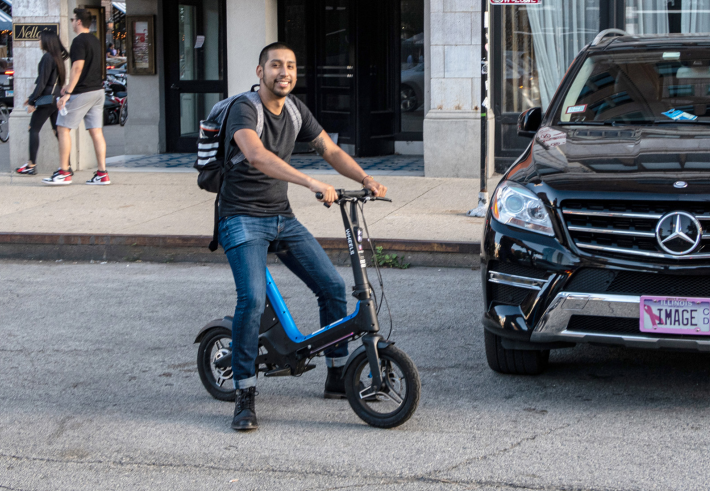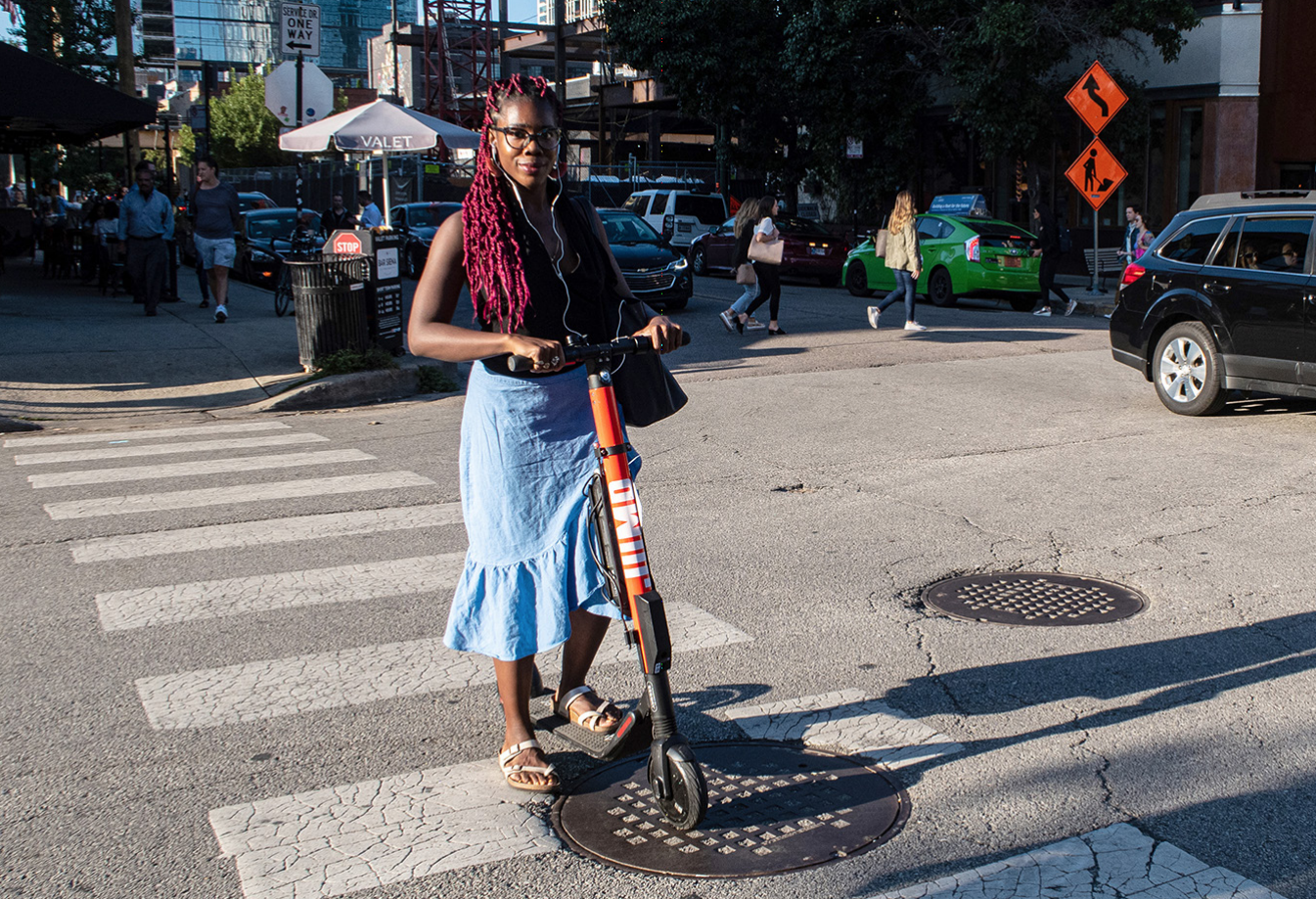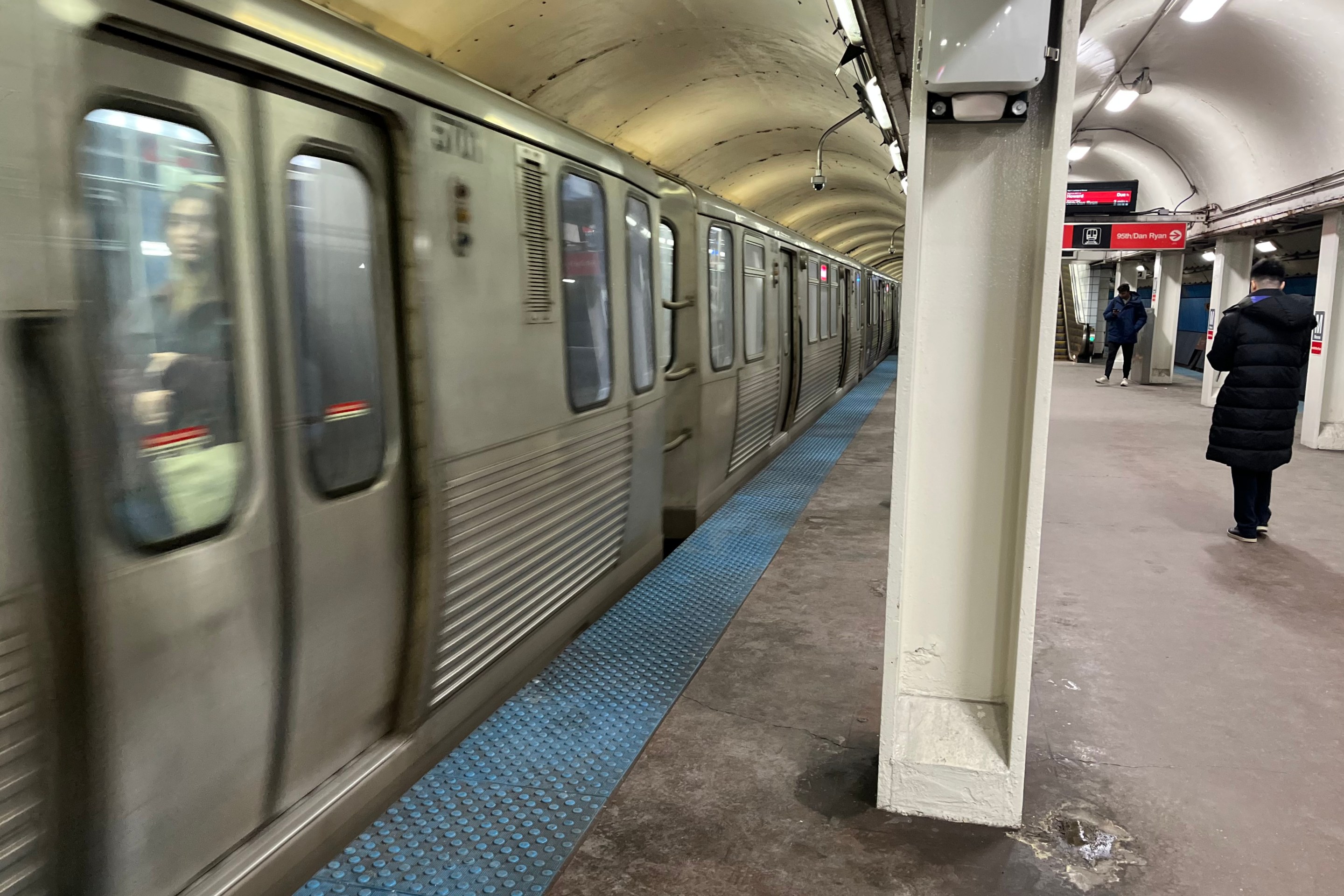Chicago's four-month dockless electric scooter pilot ends tomorrow, with 772,450 trips taken as of last week, according to the Chicago Department of Business Affairs and Consumer Protection, which has been overseeing the test. With a total of 2,500 scooters from 10 different companies scattered across the West and Northwest Side service area, that boils down to about three rides a day per scooter, which is nothing to sneeze at. But with concerns remaining about safety, street clutter, environmental impacts, and other issues, the jury is still out over whether the new transportation mode has been a net positive for the city.
An Active Transportation Alliance study released today concludes that the e-scooter program should be expanded citywide, but it recommends a number of new regulations and policies to help ensure that the technology is beneficial for all Chicagoans.
To gather info for the report, Active Trans surveyed 1,541 members and supporters in Chicagoland. The advocacy group acknowledged that this wasn't a representative sample, since respondents skewed heavily white, male, and wealthy. Sixty-two percent live or work in the pilot area; and 61 percent never rode an e-scooter. Sixty-three percent of people who responded to the survey are in favor of a long-term scooter program, but when you look at people who tried riding a scooter during the pilot, a whopping 91 percent are in favor of making the program permanent. Not surprisingly, opposition to extending the program was strongest among older respondents. However, race and income were not significant indicators of support.
Respondents indicated that they feel the best reason to expand the scooter program is to increase support for walking, bicycling, and transit infrastructure. They also saw potential for scooters to expand transportation access in rapid transit deserts. However, many people expressed concerns about the potential for scooter riders and other road users to be injured, and for improperly parked scooters to obstruct sidewalks.
In addition to the survey, Active Trans and the Northwest Side Housing Center in Belmont Cragin hosted a roundtable of more than a dozen West Side community leaders and residents to discuss the future of the program. Nearly all participants were in favor of expanding scooter access citywide, describing the vehicles as an affordable, fun way to get around that can serve as a first-mile, last-mile connection to transit and help bring customers to businesses.
However, the Belmont Cragin participants did have concerns about safety. They also said they want to see policies to maximize community benefits, such as requiring local hiring and fair wages, and discounted rates for low-income residents. There was support for having the city looking at parking options like docking stations and off-street corrals. They also wanted to see a portion of scooter revenue earmarked for walking and biking infrastructure, especially in underserved communities. Above all, they wanted community leaders to have decision making power as choices about the future of e-scooters.
Active Trans also hosted a scooter feedback night last month at Revolution Brewing (which I spoke at), and over 80 people showed up. More than 75 percent of attendees said they support a long-term program, although people wondered whether e-scooters are actually replacing car trips, and were curious how a scooter program would work during a snowy Chicago winter.
As far as Active Trans' own policy analysis, the report notes that questions about scooter safety are still open-ended. BACP has said it will provide details on injury numbers based on reports from local hospitals. Streetsblog called many hospitals within or near the pilot area and found that there were at least 34 scooter-related emergency room visits within the first seven weeks of the pilot. Active Trans points out that building more protected car-free lanes for bikes and scooters could help reduce injuries. But the report argues that scooters are not as safe as walking, biking, and riding transit, and they don't do much to improve public health in terms of increasing physical activity.

Active Trans notes that while scooter companies have touted the product as being beneficial to the environment, rebalancing and charging scooters currently involves a significant amount of driving, and national studies have found that about two-thirds of scooter trips replace walking, biking, and transit journeys, which actually causes environmental harm. To make the technology more sustainable, the Active Trans report recommends charging scooters with renewable energy, and rebalancing them with zero-emission and/or carbon-free vehicles. How about using cargo bikes to do this?
As for equity concerns, the report points out that "Venture capital and ownership of scooter companies can lead to the profit motive overriding equity and other public concerns" by increasing the cost of scooter trips or concentrating scooters in higher income areas, so a publicly owned scooter system would be preferable. But if that's not possible, the study states, "a community-informed regulatory approach is necessary." In fairness, the publicly owned Divvy bike-share program has also been concentrated in dense, wealthier neighborhoods.
The Active Trans report concludes with the following recommendations for a long-term scooter program:
- Require e-scooters to be parked in docks, painted corrals, or locked to public racks and posts.
- Keep scooters out of downtown.
- Retain and expand priority zones in low-income areas.
- Keep scooters off urban trails (including the Lakefront Trail.)
- Maintain a reasonable cap.
- Require vendors to deliver community benefits.
- Establish equitable cost structure.
- Incentivize trips to and from transit stops (including plentiful parking and discounts for parking near transit)
- Dedicate revenue to safe streets infrastructure.
- Community oversight.
Active Trans' support for making the scooter program permanent and expanding it across Chicago (except for downtown), increases the chances that the city government will do so. (If it turns out that scooter injury rates have been much worse than what Streetsblog has reported so far, that could be a potential snag.) Assuming that a citywide expansion happens, sustainable transportation advocates should continue to push for the implementation of the Active Trans report's recommendations to help ensure that the program is safe, equitable, orderly, and as environmentally friendly as possible.






